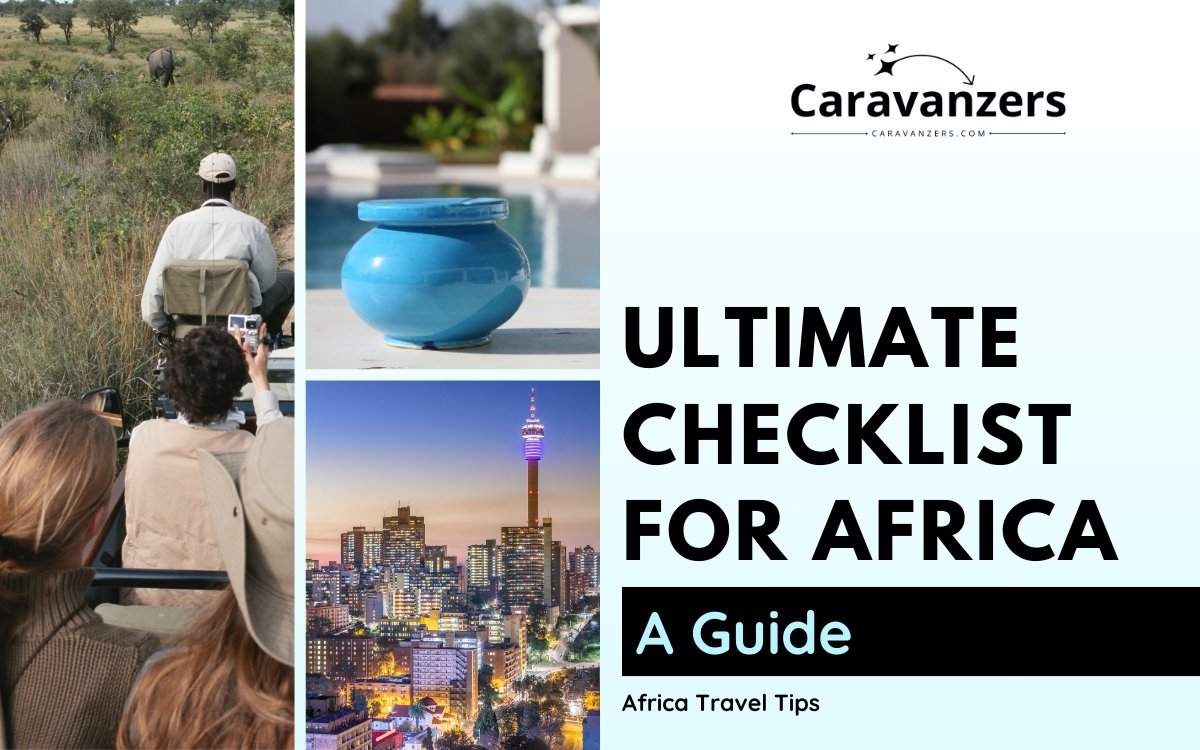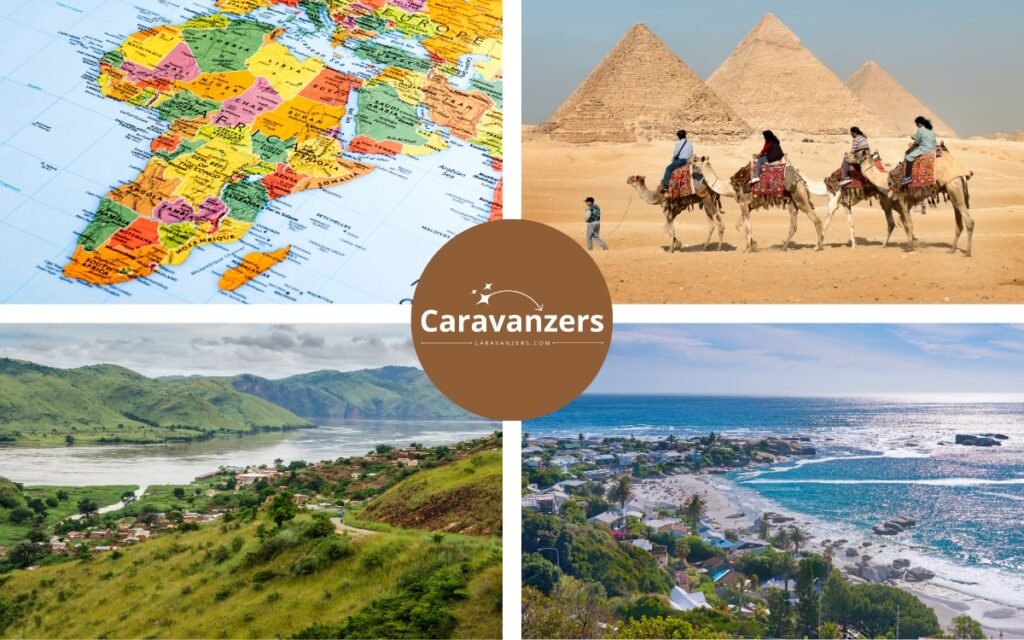
Africa travel checklist. This guide has everything you need to plan your trip, including destination requirements, vaccinations, and more.
As you probably know, there are many incredible places to visit across Africa.
In this guide, I will share travel tips and ideas on things to consider before heading on your memorable trip to this continent.
So, let’s get started.
Africa Travel Checklist

As you will see throughout this guide, Africa is really diverse, and what you need in one area may not be in another.
That said, there are some generic travel items to add to your list. For example, make sure that you have a valid passport with at least six months’ validity.
Likewise, obtain appropriate visas for each country you plan to visit. Research all of your destinations ahead of time.
Check if any vaccinations are required and get them done ahead of time. For example, Kenya has requirements such as poliomyelitis.
Similarly, you will want to consider what clothing to bring. I think you should pack lightweight, breathable clothing suitable for diverse climates.
Of course, you will want to bring insect repellent and anti-malarial medication.
If you can, and especially if you plan to travel by land, I would encourage you to carry a first aid kit with essential medications.
Meanwhile, arrange travel insurance covering medical emergencies and trip cancellations.
Also, inform your bank or credit card companies of your travel plans to avoid issues with card usage.
Finally, research local customs and cultural norms to respect traditions, secure important documents and valuables in a waterproof pouch, and stay updated on travel advisories.
Destination Requirements
With over 50 countries, the continent is diverse, and your African destination requirements can vary wildly from one to the next.
In my opinion, start with researching visa requirements, entry regulations, and vaccination recommendations for each country.
Do that at least six months before your trip, especially if you plan to visit popular destinations like Egypt or Tanzania.
Check official government websites or consult with embassies or consulates of the countries you plan to visit.
Some countries may require pre-approval or visa applications well in advance. For instance, you can’t just show up in Sudan!
By the way, on top of Sudan, there aren’t any U.S. embassies in African countries like Comoros, Libya, São Tomé and Príncipe.
So, really pay attention to destination requirements and your needs.
Stay informed about any changes or updates to travel advisories and entry policies.
Finally, consider cultural sensitivities and customs for your Africa travel checklist. Research things unique to each destination to ensure respectful behavior during your travels.
Vaccinations

Your travel essentials in Africa vary, but vaccinations should be on the higher part of your list.
Common vaccinations include yellow fever, hepatitis A and B, typhoid, meningitis, rabies, and tetanus-diphtheria.
Depending on specific destinations and activities, additional vaccines like cholera, polio, or Japanese encephalitis may be recommended.
Consult with a healthcare provider or travel clinic at least 4-6 weeks before departure.
That will give you enough time to determine which vaccines are necessary based on your itinerary, medical history, and current health conditions.
Plus, if you can, research the destination and find your own information, especially in the U.S., where some medical professionals aren’t up-to-date.
Finally, please do not skip adding vaccinations to your Africa travel checklist because some countries will literally turn you away at the airport.
Insect Repellent
As you put together your trip plans, you really ought to consider insect repellents, especially if you plan to visit rainforests.
Insect repellent is essential for Africa due to the risk of mosquito-borne diseases like malaria, dengue fever, and Zika virus.
So, I would highly encourage you to choose a repellent containing DEET, picaridin, or oil of lemon eucalyptus.
When you arrive at your destination, you should apply it to exposed skin and clothing. The part about applying to the clothing is what many travelers miss!
Also, consider using permethrin-treated clothing for added protection. I know it seems like I’m repeating myself, but this is important.
Of course, always reapply repellent as directed, especially after swimming or sweating.
Finally, do your best to sleep under mosquito nets and use insect screens or air conditioning where available to minimize exposure to mosquitoes, especially during peak biting times.
Anti-Malaria Medication
Malaria is a big problem in Africa, and millions of people contract it every single year.
So, anti-malaria medication is crucial for travelers to Africa, especially in destinations where malaria is prevalent.
Options include chloroquine, doxycycline, mefloquine, or atovaquone-proguanil (Malarone).
Personally, I hate these because they are really harsh medications, but they do the trick.
Consult with a healthcare professional to determine the most suitable medication based on your medical history, destination, and potential side effects.
Also, I would say to begin taking the medication before entering malaria-endemic areas.
Of course, like any other medication, you definitely want to adhere to the prescribed dosage regimen.
Plus, continue treatment for the recommended duration after leaving these regions to ensure protection against the disease.
If you absolutely hate medications, then I would consider natural things to avoid malaria.
While there are no natural remedies that guarantee protection against malaria, some studies suggest certain natural products may have some repellent or preventive properties.
Essential oils like citronella, eucalyptus, and neem, as well as herbal supplements such as garlic, ginger, and grapefruit seed extract, are all good options.
That said, though, I would really urge you to consult with a healthcare professional before relying solely on these natural remedies, as they may not offer sufficient protection against malaria.
Finally, malaria belongs on your Africa travel checklist because even if you don’t become “sick,” you may get infected and spread it to others. So, do the right thing.
Best Clothes for Africa

I divide Africa into northern, southern, western, eastern, and central, and each requires its own things.
Generally speaking, though, lightweight, breathable clothing like cotton or linen is ideal for most of Africa’s warm climate.
And, no matter the destination, I would urge you to consider modest attire, respecting local customs and cultural norms.
For the Sahara Desert, pack lightweight, loose-fitting clothing to stay cool during the day and warmer layers for chilly nights.
Likewise, choose fabrics that offer sun protection, such as lightweight long-sleeved shirts and pants.
Similarly, a wide-brimmed hat and sunglasses are essential for shielding against the intense sun.
Additionally, bring a scarf or shemagh to protect your face from blowing sand and dust. Don’t forget to stay hydrated and carry sufficient water and sunscreen.
For rainforest regions, prioritize lightweight, quick-drying clothing that provides protection against both rain and humidity.
Also, pack moisture-wicking fabrics to keep you dry and comfortable, along with long sleeves and pants to shield against insects and foliage.
Waterproof gear such as rain jackets, ponchos, and sturdy footwear with good traction are essential for navigating wet terrain.
Of course, you should bring insect repellent and consider a mosquito net for sleeping.
In Southern Africa, pack clothing suitable for variable weather conditions.
For instance, include layers for cooler mornings and evenings, along with lightweight, breathable items for warmer daytime temperatures.
Also, bring sturdy footwear for outdoor activities and consider packing a hat and sunscreen for sun protection.
Finally, remember that clothing for your Africa travel checklist is highly personal, and you need to figure out what works for you, too.
What to Take to Africa As Gifts
As I continue to travel across the continent, I have definitely come to the conclusion that Africans are just gift-giving people.
You can’t imagine how wonderful people react when you gift them something that isn’t available in their area.
So, I would encourage you to consider culturally appropriate gifts such as locally made crafts, textiles, or traditional artwork that present your home country.
For instance, as an American traveler, you might consider bringing gifts like handmade Native American pottery or jewelry.
These gifts are a great way for cultural exchange and appreciation between yourself and the people you meet in Africa.
Meanwhile, practical items like solar-powered lanterns, rechargeable batteries, or water filtration devices can be valuable in areas with limited resources.
Of course, educational materials like books or school supplies benefit communities.
Also, personal care items such as toiletries or hygiene kits are appreciated.
Finally, remember to research cultural customs and sensitivities regarding gift-giving to ensure your offerings are well-received.
Must-Haves for Africa Travel Checklist
Pack essentials for an Africa trip, such as sunscreen, swimwear, and socks. Sun protection is so important in Africa.
Because the equator almost divides the continent, this is by far the sunniest part of our world.
Swimwear is great to bring because some great places to swim are not necessarily urban areas, and you may not find a suitable one.
Of course, socks can keep all types of crazy stuff off your feet, especially at night when things crawl around.
Likewise, I would encourage you to bring a water bottle, face towels, and hand sanitizer. Water bottles give you a chance to reuse your own.
You may wash your hands, but a face wash can help you dry them quickly.
Of course, hand sanitizers have become more popular in Africa since the pandemic started, but you will still need to bring your own.
Similarly, consider bringing a headlamp, portable solar charger, and sandals. I can’t stress enough the importance of a headlamp.
Many African urban areas are famous for cutting electricity parts of the day, so having your own headlap will allow you to keep reading.
For the same reason, a portable solar charger can keep you connected to the world by continuously charging your small electronics.
And, of course, sandals are really essential in Africa. Even if you normally wouldn’t wear them, bring them for showers… since many places are questionable.
Yeah, I think that about it for now.
Final Thoughts
Creating an Africa travel checklist ensures preparedness for diverse requirements like visas, vaccinations, and cultural considerations.
In other words, your list will enhance the overall travel experience.
As a result, I shared some tips and ideas on diverse things, including clothing, health-related items, and more.
So, as you put together your plans for the trip, keep in mind that the best thing to do is to put time on your side and plan ahead of schedule.
Enjoy Africa!
AJ Paris is a travel photographer based in New York. He is the editor of Caravanzers.
Follow us on Pinterest.
